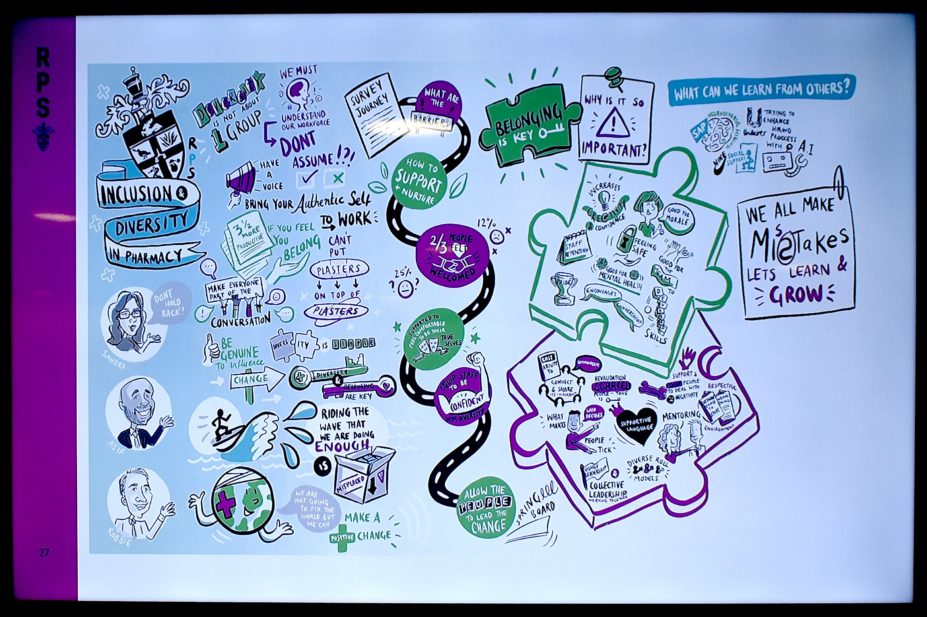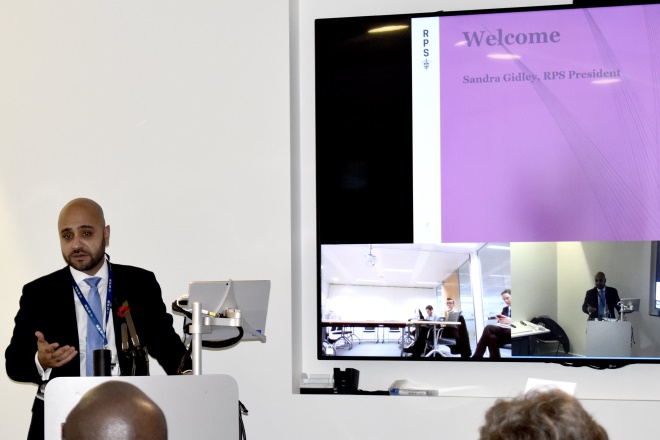
Corrinne Burns
When it comes to addressing inclusion and diversity, disability is “frequently seen as being low down on the pecking order,” according to Adrian Ward, senior disability consultant for the Business Disability Forum.
Ward spoke during a panel discussion, as part of the Royal Pharmaceutical Society’s (RPS’s) inclusion and diversity strategy workshop, which was held jointly across England, Scotland and Wales on 4 November 2019.
People with disabilities do not progress at the same rate as those without — we need to unpick that
He added that “people with disabilities do not progress at the same rate as those without — we need to unpick that”.
More than half of respondents to a recent RPS survey said more work needs to be done to support pharmacists with a disability in order to create an inclusive and diverse profession.
Respondents to the survey also said that the profession could do more to support pharmacists facing discrimination based on age, pregnancy and maternity status.
The survey formed an early stage of the RPS’s newly created inclusion and diversity programme, and the workshop was held to further unpack what RPS members and stakeholders wanted the Society to do as part of this work.

Source: Corrinne Burns
Asif Sadiq, chair of the Inclusion and Diversity programme
Addressing attendees on the day, Asif Sadiq, chair of the inclusion and diversity programme, emphasised that inclusion alone was not sufficient: real change requires that all professionals feel a sense of belonging.
“Belonging differs from inclusion. Inclusivity leads to a sense of safety and trust, and it’s that that leads to belonging,” he said.
Diversity goes beyond protected characteristics
Sadiq also said that inclusion and diversity polices should not be based solely on “visible diversity” as by doing so, we risk making assumptions about individuals and, potentially, start forming stereotypes.
“[Diversity] goes beyond protected characteristics,” he added.
Delving into the diversity range, Sadiq noted that “age diversity is becoming very topical”. Many companies focus recruitment on millennials, “which is great, but sometimes we forget the experience our older workforce can offer”, he explained, adding that older workers often stay with an employer for much longer than newly qualified pharmacists, and so can offer more team stability.
He also pointed out that the black, Asian and minority ethnic (BAME) definition incorporates a very large group of people, and the needs of people within this broad BAME definition can be very different.
However, he said that people should not be afraid of making mistakes or saying the wrong thing when tackling inclusion and diversity issues.
“Be genuine and authentic in your intent: that’s the key. It’s OK to make mistakes,” he said.
Sandra Gidley, president of the RPS, encouraged attendees to share their views freely: “If something feels uncomfortable to say, it’s probably something that needs to be said.”
“We want to see the faces at the top of the profession reflect the profession as a whole. At the moment, I don’t think we can truly say that happens,” Gidley added.
Discussions between attendees highlighted some recurring themes: notably, that a diverse workforce creates a sense of belonging and fosters greater recruitment and retention, and therefore improves patient care.
If we feel our best, we give our best to patients
Conversely, lack of support can lead to poor mental health, which again has an effect on patient care. “If we feel our best, we give our best to patients,” one attendee said.
Others said that it’s important to challenge unacceptable comments and behaviour in the workplace, even though “it is not always easy to be the person who stands up”.
Another attendee suggested the RPS and other professional bodies could provide more support in responding to unacceptable behaviour.
Sharing her vision of true inclusion and diversity in pharmacy, Elsy Gomez Campos, president of the UK Black Pharmacists’ Association, told attendees: “I want to be part of a profession where we do not have to discuss these issues, where inclusion and diversity is embedded in everyday practice.”
Summing up the day, Robbie Turner, director of pharmacy and member experience at the RPS, added that pharmacists “have a commitment from us at the RPS”.
“We will develop a piece of work that will promote belonging across the profession,” he said.
You may also be interested in

RPS meets with government to discuss pharmacists amending prescriptions during medicines shortages

A third of pharmacists report COVID-19 significantly impacted their mental health and wellbeing
